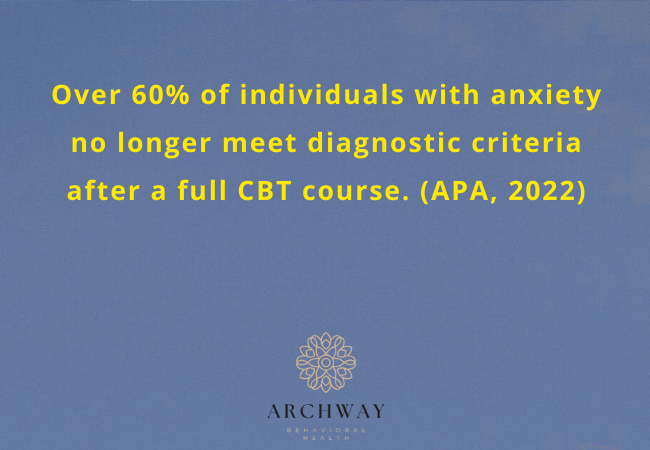Mental health treatment has evolved significantly over the last few decades, but one therapy remains a cornerstone of effective care across diagnoses, populations, and care settings: Cognitive Behavioral Therapy (CBT).
CBT is not a passing trend or a one-size-fits-all model—it is a deeply researched, scientifically validated approach that helps people transform how they think, feel, and behave. Whether you are struggling with anxiety, depression, bipolar disorder, or trauma-related symptoms, CBT offers practical tools to help you regain control over your mental health.
At Archway Behavioral Health, we integrate CBT into our full continuum of care, including Individual Therapy in Florida, Group Therapy in Florida, and our highly structured Intensive Outpatient Program (IOP) and Partial Hospitalization Program (PHP). Our team uses CBT not just because it works—but because it empowers people to understand their minds and change their lives.
In this blog, we’ll explore the neuroscience, clinical evidence, and real-life impact of CBT, and how it forms the backbone of our approach to healing at Archway.
What Is CBT? Understanding the Foundations
Cognitive Behavioral Therapy is a structured, time-limited, goal-directed form of psychotherapy. It focuses on how our thoughts (cognitions), emotions, and behaviors interact—and how altering just one element can create significant change.
CBT is based on three core assumptions:
- Our thoughts shape our emotions and behaviors.
- Unhelpful thoughts and beliefs can be identified and challenged.
- By practicing new ways of thinking and behaving, we can improve our mental health.
Developed by Dr. Aaron Beck in the 1960s, CBT has since grown into a global standard in psychological care, embraced by clinicians, psychiatrists, and researchers alike.
The CBT Triangle: A Framework for Understanding Change
At the heart of CBT is the cognitive triangle, which illustrates the link between:
- Thoughts: What we believe or tell ourselves.
- Feelings: Our emotional reactions.
- Behaviors: How we respond or act.
For example:
- Thought: “I’m going to fail this test.”
- Feeling: Anxiety and dread.
- Behavior: Procrastination or avoidance.
CBT helps individuals interrupt this cycle by:
- Identifying the thought (“I’m going to fail”)
- Challenging its validity (“I studied for five hours”)
- Replacing it with a more helpful thought (“I’m prepared and I’ll do my best”)
- Changing behavior (Completing the test without avoidance)
Over time, this practice reshapes the brain’s automatic response patterns, allowing for more flexible, adaptive coping.
Neuroscience of CBT: How It Rewires the Brain
CBT doesn’t just feel helpful—it produces measurable biological changes in the brain.
Neuroimaging studies (using fMRI and PET scans) have shown that CBT:
- Reduces overactivity in the amygdala, the brain’s fear and emotion center.
- Strengthens the prefrontal cortex, responsible for rational thought, planning, and decision-making.
- Enhances connectivity between the default mode network (DMN) and salience network, allowing individuals to shift away from negative thought loops and refocus attention.
- Promotes neuroplasticity—the brain’s ability to form new neural pathways through repetition and learning.
This means CBT doesn’t just change your mindset—it changes the structure and function of your brain over time.
The Clinical Evidence: Why CBT Is a Gold Standard
CBT is one of the most well-researched and widely used forms of therapy in the world. Major institutions including the American Psychological Association (APA), National Institute of Mental Health (NIMH), and World Health Organization (WHO) recommend CBT as a first-line treatment for several mental health disorders.
Efficacy by the Numbers:
- 75–80% of individuals see symptom reduction with CBT. (APA, 2023)
- CBT is as effective as antidepressant medications for mild-to-moderate depression. (Cochrane Review, 2022)
- CBT is the only therapy with long-term relapse prevention benefits equal to or better than medication for depression and anxiety.
- CBT shows consistent results across ages, ethnicities, diagnoses, and treatment settings.
CBT for Specific Diagnoses: The Research-Backed Approach
Anxiety Disorders
CBT is extremely effective for:
- Generalized Anxiety Disorder (GAD)
- Panic Disorder
- Social Anxiety Disorder
- Phobias
How it works:
- Teaches clients to identify irrational fears.
- Uses exposure therapy to confront and overcome triggers.
- Reduces safety behaviors (like avoidance or compulsive checking).
Evidence: Up to 80% of clients experience significant improvement within 12–16 sessions.
Depression
CBT helps address:
- Negative automatic thoughts
- Cognitive distortions like overgeneralization, catastrophizing, and mind reading
- Behavioral avoidance and inactivity
How it works:
- Encourages behavioral activation (re-engaging with life).
- Challenges core beliefs around self-worth and hopelessness.
Evidence: CBT is equally or more effective than medication, especially in preventing relapse.
Bipolar Disorder
CBT supports:
- Depressive episodes and emotional instability.
- Medication adherence and routine building.
- Crisis prevention and self-awareness.
Evidence: When combined with medication, CBT reduces hospitalizations, improves quality of life, and enhances mood stability.
OCD (Obsessive-Compulsive Disorder)
CBT for OCD includes Exposure and Response Prevention (ERP), the most effective treatment method.
How it works:
- Gradual exposure to feared stimuli.
- Prevention of compulsive behavior.
- Reduction of distress and obsessional thinking.
Evidence: ERP (a form of CBT) leads to lasting improvements in 60–70% of OCD patients.
Trauma and PTSD
CBT reduces trauma symptoms by:
- Helping clients process intrusive memories.
- Reframing maladaptive guilt or shame.
- Teaching grounding and regulation tools.
Evidence: CBT for PTSD shows 60–90% symptom improvement, often maintained over time.
How Archway Behavioral Health Integrates CBT
At Archway, CBT is central to our clinical philosophy. We embed CBT strategies into every level of care:
Partial Hospitalization Program in Florida (PHP)
- 5–6 days/week, 6+ hours/day
- Daily CBT-based groups and 1:1 therapy
- Focus on stabilization, emotional regulation, and relapse prevention
- Ideal for those needing intensive, structured care without hospitalization
Intensive Outpatient Program in Florida (IOP)
- 3–5 days/week, 3–4 hours/day
- Continued CBT immersion in a flexible, community-integrated format
- Great for step-down care or moderate-to-severe mental health symptoms
Individual Therapy in Florida
- Weekly or bi-weekly CBT sessions with a licensed therapist
- Personalized to target core beliefs, behavioral patterns, and emotional triggers
Group Therapy in Florida
- CBT-focused group sessions covering:
- Thought reframing
- Managing triggers
- Relapse prevention
- Coping skills
- Promotes shared learning, accountability, and support
CBT + DBT + Psychiatry: Our Integrated Model
CBT at Archway is not offered in isolation. We enhance its impact with:
- Dialectical Behavior Therapy in Florida (DBT) for clients with emotion dysregulation, self-harm, or interpersonal challenges.
- Medication management to stabilize mood and reduce symptom severity.
- Trauma therapy (e.g., EMDR) for clients with complex PTSD or early childhood trauma.
- Holistic wellness programs, including mindfulness, yoga, nutrition, and stress management.
This multi-layered model ensures that CBT is just one part of a well-rounded, highly personalized healing plan.
Why Choose Archway Behavioral Health?
At Archway, CBT isn’t just a tool—it’s part of our mission to deliver evidence-based, individualized care that respects every client’s journey. Whether you’re seeking relief from anxiety, struggling with mood swings, or rebuilding after trauma, CBT can provide the structure, insight, and support you need.
What Makes Us Unique:
- Expert clinicians trained in CBT, DBT, trauma therapy, and integrated psychiatry
- Customized treatment plans aligned with each client’s goals
- Safe, inclusive, stigma-free environment for healing
- A full spectrum of care: PHP, IOP, individual therapy, and aftercare
Conclusion
In a world where mental health solutions are often confusing or inconsistent, Cognitive Behavioral Therapy stands out for one clear reason—it works. Grounded in decades of clinical research and supported by modern neuroscience, CBT helps people not only manage their symptoms, but truly change the way they think, feel, and live.
At Archway Behavioral Health, we don’t believe in quick fixes or one-size-fits-all answers. We believe in evidence-based care, personalized treatment, and giving you the tools to thrive—not just survive. Whether you’re facing anxiety, depression, bipolar disorder, or trauma, CBT offers a path forward that’s practical, empowering, and proven to work. Ready to take the next step toward real change? Call Archway Behavioral Health today at 888.488.4103 to schedule your confidential consultation. Together, we’ll put the science of healing to work—so you can reclaim your life with clarity, strength, and confidence.
Frequently Asked Questions (FAQ)
What is Cognitive Behavioral Therapy (CBT)?
CBT is an evidence-based form of psychotherapy that helps individuals identify and change negative patterns of thinking and behavior. It’s proven effective for treating anxiety, depression, bipolar disorder, PTSD, and other mental health challenges.
How does CBT actually change the brain?
Research shows that CBT helps rewire neural pathways by reducing activity in fear centers like the amygdala and strengthening the prefrontal cortex—the part of the brain responsible for rational thinking, decision-making, and emotional regulation.
How long does CBT take to work?
CBT is typically short-term, with noticeable results often seen in 8–16 sessions. However, the number of sessions can vary depending on your goals and the severity of symptoms. Archway offers CBT in both short- and long-term formats, including IOP and PHP.
Is CBT used with medication?
Yes. At Archway, CBT is often integrated with psychiatric care. Combining CBT with medication management can be especially effective for disorders like depression, anxiety, and bipolar disorder.
Is CBT available in both group and individual therapy?
Absolutely. Archway offers Individual Therapy in Florida and Group Therapy in Florida, where CBT is used to help clients explore thoughts, build coping skills, and apply new behaviors in real-life situations.



